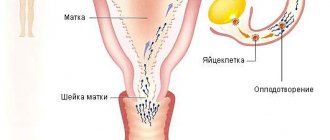Pregnancy is a hormone-dependent process
Pregnancy is a natural process for a woman’s body.
The gestation period is completely dependent on hormones. From the moment of conception, the hormonal sphere is aimed at the successful gestation of the fetus and delivery on time. If the hormones responsible for preserving the fetus are insufficient for some reason, then there is a threat of miscarriage. The importance of this hormone is described in detail in the article “Progesterone: hormone levels by week of pregnancy.” Often the hormonal balance is disrupted by a previous interruption of gestation, regardless of whether it was surgical or medical interruption. It is believed that pharmaceutical abortion causes a greater blow to hormones, so subsequent pregnancy after medical termination of pregnancy can be problematic. Other factors also influence the unfavorable course of gestation:
- Inflammatory diseases of the female organs.
- Chronic diseases of women.
- Diseases of organs that produce hormones.
- Stressful, depressive conditions.
Recovery after pharmaabortion
Pharmaboration involves gross interference with hormonal levels. In particular, the drug mifepristone blocks the production of the hormone progesterone, without which gestation is impossible. It is progesterone that begins to be produced from the moment of conception, and conception, and ensures reliable fixation of the embryo in the uterus and its successful development.
After an uneventful interruption of gestation, recovery requires at least six months. During this time, the female organs are restored and the menstrual cycle is established. This will be an indication that the hormones have returned to normal.
If complications arise after medication interruption, the recovery process is delayed. First, you should get rid of the resulting consequences, and then, after 6 months, judge the recovery of the body.
After completing the abortion procedure, the doctor must give each patient recommendations on how to restore the body. These recommendations include a ban on sexual activity, in particular classical sexual intercourse, and explains in detail when you can become pregnant after medical termination of pregnancy. The ban will protect against a new conception and allow the inner layer of the uterus to recover.
Traditionally, recovery includes:
- Compliance with doctor's recommendations, especially regarding sexual intercourse.
- Drug therapy in the presence of complications.
- Vitamin complexes, preference specifically designed for women.
- Healthy lifestyle, rational comparison of work and rest time.
- Getting rid of depression, if it occurs.
General information
Medical abortion is the termination of pregnancy using medications. This method is recognized as the safest for women's health. After medical termination of pregnancy, the body recovers as quickly as possible. That is why medical abortion is especially popular as the most gentle method of solving the problem of unwanted pregnancy.
Unlike surgical abortion, medical abortion does not require dilation of the cervical canal and intervention in the uterine cavity. The use of medications leads to the fact that the fertilized egg exfoliates from the walls of the uterus and comes out due to contraction of the myometrium. After a complete abortion, no elements of the fertilized egg remain in the uterine cavity, and the endometrium is slowly restored, growing layer by layer for a new cycle.
Medical abortion does not always go well. After the manipulation, complications may develop that interfere with the onset of a new pregnancy:
- menstrual irregularities;
- retention of parts of the fertilized egg;
- uterine bleeding;
- drug intolerance.
Medical abortion is performed for up to 6 obstetric weeks (42 days from the date of the last menstruation). At a later date, only surgical termination of pregnancy is possible. After an abortion, the condition of the uterus must be assessed using ultrasound. In some cases, even with a correctly performed procedure, elements of the fertilized egg remain in the uterine cavity. In this case, the woman undergoes a surgical abortion to remove all retained parts of the embryo.
When can pregnancy occur after medical termination of pregnancy?
Many people believe that after an abortion with drugs, it is impossible to get pregnant for a certain period of time. But this opinion is erroneous, because... Conception can occur even before the arrival of the first menstruation. Usually the egg is released on day 14, after a medical abortion. Based on this, unprotected sexual intercourse can contribute to the development of a new gestation.
Important!
Immediately after pharmaboration, you should use a proven method of contraception!
Possible consequences
Every woman decides for herself whether or not to drink alcohol after an abortion. Outsiders cannot influence such a decision. However, they should try to convey to her information about the possible consequences of a wrong decision. Doctors call the main consequences of drinking alcohol:
- Risks of the appearance of foci of inflammation in the uterine cavity.
- Significant weakening of immune processes, which can provoke the development of systemic diseases.
- Opening of uterine bleeding, which will lead to significant blood loss.
- Alcohol poisoning.
- Intoxication.
- Increasing the rehabilitation period after an abortion.
- uterine bleeding requiring instrumental evacuation of the uterus in a hospital (vacuum aspiration of the uterine cavity) and the use of uterine contractions;
- incomplete abortion (remnants of the fertilized egg are also removed using vacuum aspiration of the uterine cavity in a hospital);
- infectious complications (the risk of their development is less than 1% of cases);
- progression of pregnancy in a situation where rejection of the fertilized egg has not occurred.
If medical abortion is ineffective and pregnancy progresses, the patient is offered to terminate the pregnancy using vacuum aspiration.
There have been no large-scale studies on the teratogenic effect of drugs for medical abortion on the fetus, but 14 cases of fetal defects developing after using this regimen are known. If the patient suddenly changes her mind and decides to carry an advanced pregnancy, she should be warned about these known cases.
Early pregnancy after medical abortion. What is the danger?
Early pregnancy after medical termination of pregnancy happens quite often. Women, for various reasons, neglect the doctor’s recommendation to prohibit sexual intercourse after medical termination. As a rule, a new pregnancy results in new stress for the body and depression.
Any final result of pregnancy occurring earlier than six months after medical termination of pregnancy is likely to have undesirable consequences.
If a woman decides to give birth, complications are possible:
- Failure to carry to term due to hormonal imbalance or failure of the endometrium (inner layer of the uterus), from a previous abortion. Often in such a situation, a natural interruption or miscarriage occurs.
- Feto-placental insufficiency, which occurs against the background of distorted functioning of the placenta. This can occur due to hormones and often increased uterine tone.
- Hypertonicity of the uterus is due to the fact that the uterus was in a tense state due to the pharmacological abortion performed shortly before a new conception. In a short period of time, before the new gestation, she did not have time to return to normal. A new pregnancy provokes an increase in tension.
- Developmental delay or fetal fading is caused by the above complications. The consequence of developmental delay is the birth of an immature, often weakened baby.
- Ectopic location of the embryo, which occurs due to dysfunction of the female organs against the background of hormonal “stress”. This complication is described in detail in the article “Ectopic pregnancy: signs and symptoms.”
A woman, arriving in a state of depression from a new pregnancy, often decides to terminate it. However, this option can lead to an extremely undesirable complication - infertility. You will learn about other causes of this disease from the article “Infertility: Causes.”
If you suspect a new unplanned gestation after pharmaabortion, you should urgently visit a doctor and perform an ultrasound. Tests often distort results because... the concentration of human chorionic gonadotropin in the urine decreases slowly, which causes a positive result.
Two stripes?
It happens that shortly after an abortion, a woman takes a test and sees two lines, and this is often frightening. In this case, a positive test may be misinterpreted; this does not mean that the woman became pregnant immediately after the abortion.
The test determines the presence of a hormone in the urine, which appears due to the formation and function of the placenta. After the expulsion of the fertilized egg, the hormonal levels begin to recover, but this happens slowly. A few more weeks after the procedure, tests may show positive results; this often happens after a pharmaceutical abortion.
It will be better if the woman turns to a specialist. After conducting a little research, he will be able to dispel fears or identify the fact of a progressing pregnancy. The probability is very small - 2-5%, but still it exists.
When can you get pregnant after a medical abortion? The right approach is planning
A woman is pushed to have an abortion by circumstances that are sometimes independent of her wishes. Many, after this unpleasant step, plan to carry and give birth to a healthy and strong baby. This must be taken seriously; pregnancy must be planned.
Planning begins after 6 months from an uncomplicated abortion. The beginning of planning will be a thorough examination of the future parents, in particular the expectant mother. Before contacting a specialist, a woman should keep a “Women’s Calendar” for at least several cycles, recording menstrual cycles in it.
The examination, with a history of pharmacies, will not differ much from the standard one. A set of tests can be found in the topic “Tests before planning pregnancy.” The doctor will pay special attention to hormone levels, menstrual cycles and ultrasound. If violations are noticed, then correction is required. After the examinations, based on the results, the doctor will tell you when you can get pregnant after medical termination of pregnancy. Before this period, be sure to use a reliable method of contraception.
Safely carrying and delivering a healthy baby is the goal of every woman.
And nothing should interfere with this. In most cases, a desired and planned pregnancy after a medical termination of pregnancy ends with the birth of a charming, strong baby. Author of the publication: Olga Lazareva
What is the likelihood of getting pregnant quickly after an abortion?
The chances of pregnancy for women who have had an abortion are the same as for women who are not familiar with this unpleasant procedure. The problem is not pregnancy, but the ability to bear a fetus.
This is why gynecologists recommend refraining from planning a pregnancy for 6-12 months.
No doctor can accurately answer the question about the likelihood of pregnancy.
One can only assume that it is easier for women at a young age who do not have gynecological diseases to conceive.









